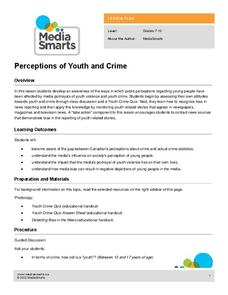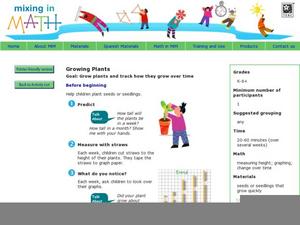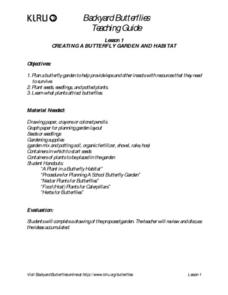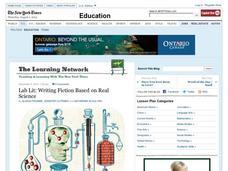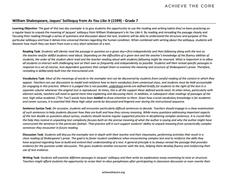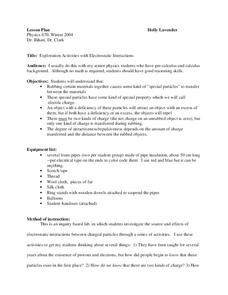eGFI
Crystal Study
Diamonds are a girl's best friend! Crystal labs can be a science teacher's best friend because watching crystals develop is fascinating, and it results in such a pretty product! This activity is unique because the crystals are grown...
Media Smarts
Perceptions of Youth and Crime
Explore the potential for bias in the news and in scholars' own attitudes and opinions. Begin with a quiz on youth crime to see how learners perceive crime among their peers. After looking at the correct answers, put individuals in...
Mixing In Math
Mixing in Math: Growing Plants
Whether you have your class plant seeds or begin when sprouts are visible, math skills are used here to predict and track growth over time. Straw bar graphs show plant height on a given day while the graph as a whole shows changes over...
Curated OER
Phonics Instructional Routine: Read and Write Words with Consonant Digraphs
Use consonant digraphs to introduce learners to word patterns and high frequency words. They observe a chart with the digraphs /sh/, /ch/, /th/, and /wh/. After listening to each of these phonemes, scholars watch as the teacher...
PBS
Creating a Butterfly Garden and Habitat
This complete set of instructions for creating your very own butterfly garden and habitat is so cool! With some seeds and the handy resources in this activity, you and your class will be able to determine which type of habitat is best...
The New York Times
Writing Fiction Based on Real Science - NYTimes.com
Refuse to alienate your scientific-minded young scholars during your creative writing unit. Learners explore how literary writing can reflect observable fact, and be based in actual science. The links include examples of fiction and...
California Academy of Science
Colorful Fish Adaptations
I love lessons that incorporate the arts, they're so engaging and address a more diverse set of learners. Your class will investigate the reasons fish from the coal reef have adapted such colorful fins. They design a fish that uses color...
Center Science Education
Investigating the Climate
What do graphs of atmospheric gases over time show us? Do they indicate that carbon sources and carbon sinks are not in balance? Up-and-coming meteorologists watch video clips, read information, and analyze data from the HIPPO (HIAPER...
Scholastic
Study Jams! The Senses: Seeing
What will viewers see when they watch this video about vision? They will observe RJ and Sam hanging out during a power outage with Rookie, the dog. The boys discuss the structure of the eye (pupil, iris, cornea, lens, retina, optic...
Baylor College
Finding the Carbon in Sugar
In session one, demonstrate for your class how a flame eventually goes out when enclosed in a jar in order to teach that oxygen is required for combustion. In session two, class members then burn sugar in a spoon to observe how it...
Baylor College
What Is the Water Cycle?
Small groups place sand and ice in a covered box, place the box in the sunlight, then observe as evaporation, condensation, and precipitation occur. These models serve as miniature water cycles and demonstrations of the three phases of...
Scholastic
Study Jams! The Moon
Take your class to the moon and back with this compact slide show. A mix of computer-generated images and photographs are supported by explanatory text. Observers learn about the moon's movements, its physical features, and its phases....
Curated OER
Ladybugs, Ladybugs, Ladybugs
Those lovely ladybugs are so cute, and so very useful! Use a short unit to explore insect anatomy, the ladybug life cycle, and the help ladybugs provide organic farmers. The unit is comprised of four short thirty-minute lesson plans that...
Exploratorium
Moire Patterns
By overlapping combs and window screening and by looking at a printed set of consecutively larger circles, learners observe Moire patterns, which provide a visual of what happens during wave interference.
Exploratorium
Diffraction
Kindle knowledge of how light travels by using this activity in your physical science curriculum. By setting up a candle flame or flashlight bulb and viewing it through a slit, observers of light see evidence of its wave characteristic....
Curated OER
"As You Like It" by William Shakespeare
Jacque's soliloquy from Act II, scene ii of As You Like It sets the stage for a close reading exercise that models how to approach difficult, dense text and enables readers to practice reading comprehension and analysis skills. Learners...
American Chemical Society
Dissolving a Substance in Different Liquids
Second of six lessons in a unit on dissolving, this one focuses on how sugar behaves in different liquids. Learners stir it into water, alcohol, and oil and make observations. This lesson can stand alone, but is best used as part of the...
American Chemical Society
Mysterious M&M's
The first in a six-lesson mini unit, all using M&Ms® candies, this physical science activity gets kids to observe a single piece and discover what happens when it is placed in a plate of water. The activity can be used to introduce...
Exploratorium
Resonant Rings
Physical or earth scientists construct this clever contraption to demonstrate how size effects frequency. Several paper rings of various sizes are taped onto a board and shaken to create vibrations. The resonant frequencies are easily...
Captain Planet Foundation
George Washington Carver and the Sweet Potato
Learn about George Washington Carver's important contributions to agriculture by studying the sweet potato. First graders read about the inventor's observations and prepare sweet potato slips for the class garden. Additionally, they...
Ohio State University
Exploration Activities with Electrostatic Interactions
Step out of the 21st century and discover protons and electrons through observation. Using common materials, participants continually adjust their explanation of charges. The final assessment requires pupils to design their own...
PricewaterhouseCoopers
The Stock Market
Keep or sell? Young learners simulate as buyers in the stock market while learning about the benefits and important factors to know when purchasing. The thorough resource allows for observation of case studies and provides an assessment...
NASA
Stellar Fingerprints and Doppler Red Shifts
Young scientists observe the spectra of elements and compare that to the Doppler effect. Hook scholars from the beginning all the way to the extension activities in this 5E-format lesson.
Facing History and Ourselves
How Journalists Minimize Bias
Class members are challenged to write a neutral news story about the events they observe in a short video. After sharing their stories in groups and discussing the different perceptions, the class concludes with a video of journalists...
Other popular searches
- Observation and Inferences
- Observation Skills
- Student Teacher Observation
- Observation Inference
- Making Observations
- Scientific Observation
- Inference and Observation
- Observation Log
- Weather Observation Chart
- Observations and Inferences
- Direct Observation
- Science Observation Skills



